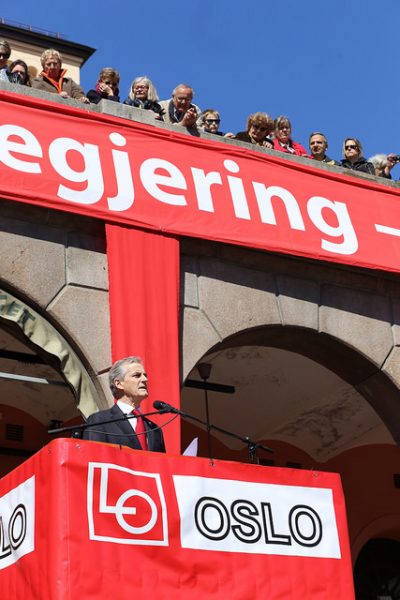Labour Party leader Jonas Gahr Støre has run into trouble after newspaper Dagbladet revealed last week that his family firm, Femstø AS, invested in two housing projects in Oslo that employed workers with no labour union contracts, and on terms Støre himself has been fighting. Støre quickly withdrew from the projects, but accusations have continued that he wasn’t practicing what he preached.

On Monday morning, Labour Party MP Anniken Huitfeldt was having to fend off criticism on Støre’s behalf. Huitfeldt said on state broadcaster NRK’s debate program Politisk kvarter that Støre, who comes from a wealthy family, was only “a passive investor” in the disputed housing project, with a 3 percent stake. “He hadn’t had time to involve himself in what kinds of contracts the workers had,” Huitfeldt said.
She also noted that the housing project itself was operating “within the law” in offering workers wages only when they were actually working and not in between jobs. Støre has blasted that form of labour contract, most recently in his Labour Day address before thousands of people on May 1st. He claimed it was replacing “those who once stood with their hats in their hands, hoping for work, with those who today stand with their mobile phones in their hands, hoping they’ll be called in to work.” He equated such practice to the kind of jobs handed out to non-union workers, only to invest in a project that used them, even though they’re legal.
Huitfeld also tried to turn the tables on political opposition, claiming that the current conservative government coalition has done nothing to make such practice illegal in Norway. She vowed that if Labour wins government power this fall, it will work towards changing the law that currently allows it.
Blunder
Newspaper Dagbladet also revealed that workers on the housing project Støre was involved in also had no central collective bargaining agreement or organized employees. That was another blunder that prompted Støre to withdraw from the project to build 188 condominiums, in which high-profile investor Stein Erik Hagen was also involved, along with cosmetics heiress Tove Midelfart. Støre’s family’s wealth originally stems from its sale of the Jøtul oven and fireplace producer.
Støre was said to be out traveling and unavailable for comment when Dagbladet first broke the story last Thursday. Camilla Ryste, Støre’s media contact, said on Friday that “as a result of the issues Dagbladet has raised, and because it’s difficult for Støre to follow up the (housing) projects closely and directly, he has started a process to sell Femstø’s ownership stakes in the building projects.”
Støre later told Dagbladet that he simply wasn’t aware of the working conditions at the housing projects and was surprised. He claimed, before Huitfeldt followed up Monday monring, that the construction business has “structural challenges” that must be met politically. “Therefore the Labour Party wants to tighten regulations and clean up a branch that has developed in the wrong direction,” Støre told Dagbladet. “I’m engaged in securing serious operators and proper working conditions.”

His own firm’s involvment in a project that does not fulfill Labour’s definition of “proper working condition” comes just as Norway’s biggest trade union confederation, LO, and the Labour-led city government in Oslo has launched a concerted effort to address worker exploitation at building sites. Their so-called “Oslo Model” is aimed at “setting the standard” for building projects, with 80 percent of workers in full-time or at least 80-percent jobs and earning union-sanctioned wages between construction jobs. At least half the workers on construction sites should be certified trades workers, at least 10 percent should be interns on contract to train the next generation of construction workers, and contractors must be prevented from paying cash to any workers. All payments must go through bank accounts, to eliminate any black market.
The government, meanwhile, claims it has addressed the problem of worker exploitation and labour crime in Norway. Morten Bakke, a state secretary in in the Labour Ministry, praised the “Oslo Model” and claimed the government’s own strategy had cleared the way for Oslo and other municipalities around Norway to make sure their own construction projects were in order.
Worker exploitation and social dumping nonetheless remain a serious problem in Norway, especially for foreign workers. Newspaper Dagens Næringsliv (DN) recently reported how carpenters from Lithuania who were building various luxurious holiday homes (hytter) in Hallingdal had no toilet facilities on site, or any place to warm up during long winter workdays. Lars Mamen, a regional union official in Buskerud County, wrote in DN last month that he had also found cases where foreign workers were being paid just NOK 24 (USD 3) per hour.
‘Grotesque” conditions found in Oslo
Labour regulators in Oslo, meanwhile, have also uncovered “grotesque” working conditions at building sites, with low pay that’s often withheld. Many of those being exploited work through employment agencies where foreign workers have no job protection, can be fired on the spot and often have uncertain accommodation tied to the job, where they’re charged high rent. “If you demand overtime pay or pay in line with Norwegian standards, you’re not hired,” Julia Maliszewska, who works for an Oslo construction workers’ association that’s tied to trade union federation Fellesforbundet, told newspaper Dagsavisen.
In some cases, state and city building and labour inspectors fear entering building sites controlled by criminal gangs using foreign workers. “I don’t go into building sites in the inner city,” Anders Johnsen, a regional labour ombud in Oslo, told Dagsavisen. “I want to come home in the evening.” The building industry’s own trade association BNL (Byggenæringens landsforening) confirms the industry is “full of rotten apples,” especially in the remodeling and rehabilitation segment. “Players who aren’t serious have taken over large portions of the market,” Jon Sandnes, chief executive of BNL, told Dagsavisen. He also applauds the “Oslo Model” launched by the city’s Labour government, before Labour leader Støre ran into trouble of his own.
newsinenglish.no/Nina Berglund

